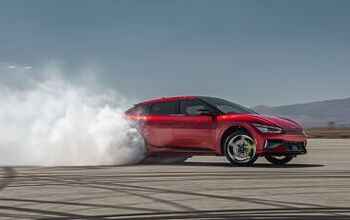Ghosn Says Slow Your Roll on the Renault-Nissan Merger, Then Confirms the Possibility

As Renault and Nissan discuss ways to strengthen their bond, Carlos Ghosn is asking everyone to slow their roll on the prospect of a merger. Despite continuously nudging the alliance in that direction, the CEO and chairman is often hesitant to discuss unification as anything more than a hypothetical. So this is par for the course.
“I don’t think you’re going to see it this year or next,” Ghosn said on Wednesday. “Lots of mergers collapse and destroy value — the strength of any company is the ability to motivate people, and how how are you going to do that if some of these people consider themselves second-class citizens.”
The second-class citizens he’s referencing are, presumably, Nissan employees seeking more influence within the Renault-Nissan-Mitsubishi Alliance. A large part of the group’s current strategy is to find ways to give the Japanese automaker more of a say in product development and operations.
As the more profitable automaker, Nissan feels it’s entitled to make decisions. But Renault currently has a 43.4 percent stake in Nissan, while Nissan only holds a 15 percent stake in Renault — effectively giving the French automaker corporate control.
Both Ghosn and Nissan’s CEO Hiroto Saikawa seem bent on creating a lasting relationship between their companies before their retirement, but they also seem keenly aware that the road ahead of them is fraught with peril — leaving both of them cautious when discussing a merger. However, Ghosn said he hoped to have see important decisions made that would strengthen the alliance by the end of this year.
“I don’t think there is a resistance,” Ghosn told Bloomberg in an interview. “Let’s try and find something that will reassure the stakeholders that this will continue, but at the same time maintain identity.”
He also issued a reminder that decisions take time to produce results within the industry, be it product or corporate developments. “You know our cycle, in terms of technology and product, is very long,” Ghosn said. “So what you are doing today is something that’s going to be visible three or four years down the road.”
He went on to stress that electric cars are regulator driven, which makes their future prospects a little easier to track. But automakers have to perpetually work with governments to help them understand the advanced technologies they’re requesting (but might not be particularly familiar with).
Getting back to the alliance, Ghosn noted that Nissan and Renault will experience a conversion, but stopped short of calling it full-blown merger. “We have already decided to have a common engineering, we have decided to have a common manufacturing, we have common purchasing,” he said. “This move toward more integration, toward doing more things in common, but still maintaining different brands [and] different identities you will continue to see.”
However, he’s worried about the sustainability of that model after the automakers’ current leadership retires. The top boss said a merger is one option for solving that problem, but not the only one. Ghosn explained that the ideal solution, for him, involves a drive for synergies to solidify the collaboration while allowing each brand to maintain its unique identity.
“At the end of the day, you need people who are proud of their brand going and fighting in all the markets,” he said. “But, at the same time, you don’t want duplication. You develop one technology, one platform, we buy together. Everything that the consumer doesn’t really care for should be done in common for the sake of efficiency and for the sake of [the price of our cars].”
[Image: Nissan]

A staunch consumer advocate tracking industry trends and regulation. Before joining TTAC, Matt spent a decade working for marketing and research firms based in NYC. Clients included several of the world’s largest automakers, global tire brands, and aftermarket part suppliers. Dissatisfied with the corporate world and resentful of having to wear suits everyday, he pivoted to writing about cars. Since then, that man has become an ardent supporter of the right-to-repair movement, been interviewed on the auto industry by national radio broadcasts, driven more rental cars than anyone ever should, participated in amateur rallying events, and received the requisite minimum training as sanctioned by the SCCA. Handy with a wrench, Matt grew up surrounded by Detroit auto workers and managed to get a pizza delivery job before he was legally eligible. He later found himself driving box trucks through Manhattan, guaranteeing future sympathy for actual truckers. He continues to conduct research pertaining to the automotive sector as an independent contractor and has since moved back to his native Michigan, closer to where the cars are born. A contrarian, Matt claims to prefer understeer — stating that front and all-wheel drive vehicles cater best to his driving style.
More by Matt Posky
Latest Car Reviews
Read moreLatest Product Reviews
Read moreRecent Comments
- Teddyc73 Oh look dull grey with black wheels. How original.
- Teddyc73 "Matte paint looks good on this car." No it doesn't. It doesn't look good on any car. From the Nissan Versa I rented all the up to this monstrosity. This paint trend needs to die before out roads are awash with grey vehicles with black wheels. Why are people such lemmings lacking in individuality? Come on people, embrace color.
- Flashindapan Will I miss the Malibu, no. Will I miss one less midsize sedan that’s comfortable, reliable and reasonably priced, yes.
- Theflyersfan I used to love the 7-series. One of those aspirational luxury cars. And then I parked right next to one of the new ones just over the weekend. And that love went away. Honestly, if this is what the Chinese market thinks is luxury, let them have it. Because, and I'll be reserved here, this is one butt-ugly, mutha f'n, unholy trainwreck of a design. There has to be an excellent car under all of the grotesque and overdone bodywork. What were they thinking? Luxury is a feeling. It's the soft leather seats. It's the solid door thunk. It's groundbreaking engineering (that hopefully holds up.) It's a presence that oozes "I have arrived," not screaming "LOOK AT ME EVERYONE!!!" The latter is the yahoo who just won $1,000,000 off of a scratch-off and blows it on extra chrome and a dozen light bars on a new F150. It isn't six feet of screens, a dozen suspension settings that don't feel right, and no steering feel. It also isn't a design that is going to be so dated looking in five years that no one is going to want to touch it. Didn't BMW learn anything from the Bangle-butt backlash of 2002?
- Theflyersfan Honda, Toyota, Nissan, Hyundai, and Kia still don't seem to have a problem moving sedans off of the lot. I also see more than a few new 3-series, C-classes and A4s as well showing the Germans can sell the expensive ones. Sales might be down compared to 10-15 years ago, but hundreds of thousands of sales in the US alone isn't anything to sneeze at. What we've had is the thinning of the herd. The crap sedans have exited stage left. And GM has let the Malibu sit and rot on the vine for so long that this was bound to happen. And it bears repeating - auto trends go in cycles. Many times the cars purchased by the next generation aren't the ones their parents and grandparents bought. Who's to say that in 10 years, CUVs are going to be seen at that generation's minivans and no one wants to touch them? The Japanese and Koreans will welcome those buyers back to their full lineups while GM, Ford, and whatever remains of what was Chrysler/Dodge will be back in front of Congress pleading poverty.


































Comments
Join the conversation
Well, it's not the ill-fated DaimlerChrysler Merger of Equals, and the two automakers already have a great relationship, so I bet it'll work out fine. And maybe it'll result in US-bound Renaults. Probably not, but maybe.
May they take Chrysler also on the board? Apparently Sergio has no clue what to do with American brands, busy with useless vanity projects like AR and Levante.